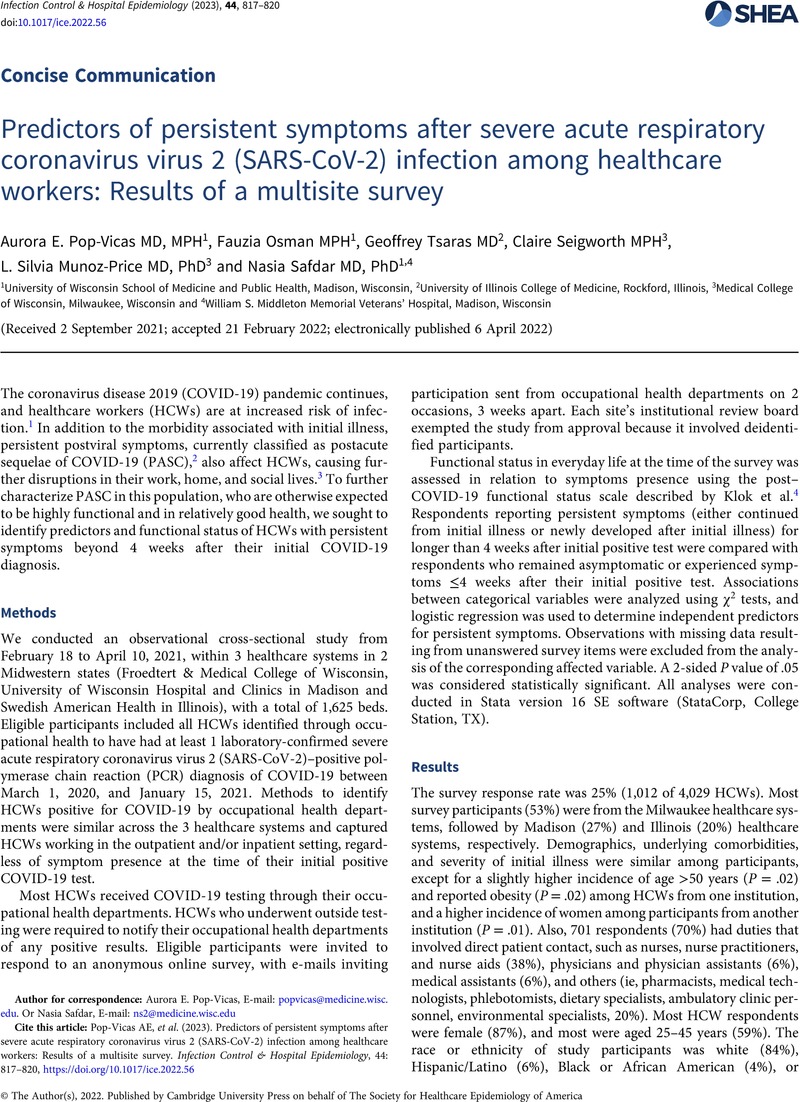No CrossRef data available.
Article contents
Predictors of persistent symptoms after severe acute respiratory coronavirus virus 2 (SARS-CoV-2) infection among healthcare workers: Results of a multisite survey
Part of:
SARS-CoV-2/COVID-19
Published online by Cambridge University Press: 06 April 2022
Abstract
An abstract is not available for this content so a preview has been provided. Please use the Get access link above for information on how to access this content.

- Type
- Concise Communication
- Information
- Copyright
- © The Author(s), 2022. Published by Cambridge University Press on behalf of The Society for Healthcare Epidemiology of America
References
Nguyen, LH, Drew, DA, Graham, MS, et al. Risk of COVID-19 among frontline healthcare workers and the general community: a prospective cohort study. Lancet Public Health 2020;5:e475–e483.10.1016/S2468-2667(20)30164-XCrossRefGoogle ScholarPubMed
Groff, D, Sun, A, Ssentongo, AE, et al. Short-term and long-term rates of postacute sequelae of SARS-CoV-2 infection: a systematic review. JAMA Netw Open 2021;4(10):e2128568.10.1001/jamanetworkopen.2021.28568CrossRefGoogle ScholarPubMed
Havervall, S, Rosell, A, Phillipson, M, et al. Symptoms and functional impairment assessed 8 months after mild COVID-19 among healthcare workers. JAMA 2021. doi: 10.1001/jama.2021.5612.CrossRefGoogle Scholar
Klok, FA, Boon, G, Barco, S, et al. The post–COVID-19 functional status scale: a tool to measure functional status over time after COVID-19. Eur Respir J 2020;56(1). doi: 10.1183/13993003.01494-2020.CrossRefGoogle Scholar
Strahm, C, Seneghini, M, Gusewell, S, et al. Symptoms compatible with long COVID in healthcare workers with and without SARS-CoV-2 infection—results of a prospective multicenter cohort. Clin Infect Dis 2022. doi: 10.1093/cid/ciac054.CrossRefGoogle ScholarPubMed
Praschan, N, Josephy-Hernandez, S, Kim, DD, et al. Implications of COVID-19 sequelae for healthcare personnel. Lancet Respir Med 2021;9:230–231.CrossRefGoogle Scholar
Dzau, VJ, Kirch, D, Nasca, T. Preventing a parallel pandemic—a national strategy to protect clinicians’ well-being. N Engl J Med 2020;383:513–515.CrossRefGoogle ScholarPubMed
Sudre, CH, Murray, B, Varsavsky, T, et al. Attributes and predictors of long COVID. Nat Med 2021. doi: 10.1038/s41591-021-01292-y.Google ScholarPubMed
Tenforde, MW, Kim, SS, Lindsell, CJ, et al. Symptom duration and risk factors for delayed return to usual health among outpatients with COVID-19 in a multistate healthcare systems network—United States, March–June 2020. Morb Mortal Wkly Rep 2020;69:993–998.CrossRefGoogle Scholar
Aminian, A, Bena, J, Pantalone, KM, Burguera, B. Association of obesity with postacute sequelae of COVID-19. Diabetes Obes Metab 2021;23:2183–2188.CrossRefGoogle ScholarPubMed



